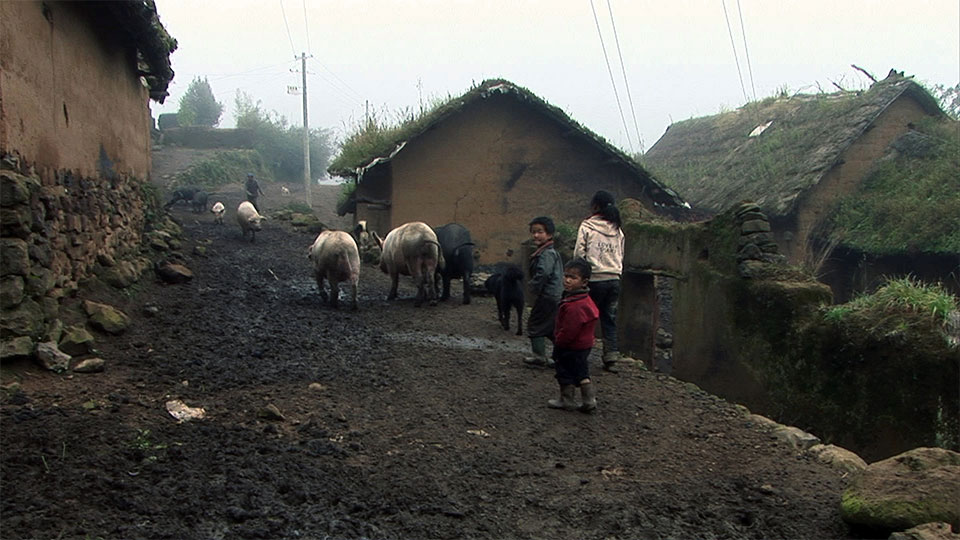Dir. by Wang Bing
There’s a shot about two hours into Three Sisters that recalls Wang’s previous film, The Ditch (2010). Yingying, who at 10 is the oldest of the three subjects of the documentary, has been left behind to live with her grandfather in their small village after her father returns to the city in search of work, this time taking Zhenzhen (6) and Fenfen (4) with him. Their mother is gone for good, having left for another man and other opportunities. Yingying sits alone in her windowless, one-room house, lit only by the faint grey sunlight from an open doorway. She’s curled up at the small table where she eats her meals and occasionally attempts to complete her homework. (In another scene we see her pretend-mouthing the words of her lessons while her classmates recite in unison.) She stares straight ahead and, as she does throughout the three-hour film, sniffs and coughs like clockwork. This is Yingying’s home but it could just as well be the underground dugout where the prisoners sleep in The Ditch, Wang’s fictional recreation of China’s labor camps of the 1950s. There’s the same loneliness and hunger, the same daily struggle to fend off decay and despair.
Wang introduced Three Sisters as “a simple film” that “might be too long.” I appreciate his humility (a hallmark of his filmmaking, too), but I think he’s wrong on both counts. There’s nothing simple about this precise assemblage of footage collected during several visits to the girls’ remote farming village, and the length of the film is, in fact, essential to its success. The sisters live a life of miserable poverty, but Wang rescues their story from the now-standard tropes of miserablist cinema and poverty tourism by respecting the temporal rhythms of that life and by acknowledging his own problematic role as a visiting observer. Yingying is never pitied by the camera (although her situation is nearly always pitiable); instead, she’s made dignified by it. We watch from a distance in long, unbroken shots as she struggles to carry a basket, throws a load of pinecones on her back, and slowly, patiently chops firewood. There’s a lived-in-ness to her movements that can only be represented on screen because Wang understands that cutting any of those behaviors into a sequence of shots would rob her work of its honor. The difference between a 3-minute, unbroken shot of a feather-light girl hacking at a tree branch and a 20-second shot of the same followed by an elliptical cut to a woodpile is the difference between documentary and fiction.
As a work of drama, Three Sisters rises and falls with the returns and departures of the girls’ father, a world-weary young man with a kind smile and a deep affection for his daughters. It’s a bit of a shock when he first appears, one hour into the film, because Wang withholds explanation of his absence until a later conversation. When, in an early scene, one of the younger girls threatens her sister with, “I’m gonna tell daddy,” it’s unclear whether her threat is valid or if she doesn’t yet understand the permanence of death. Soon after he arrives, though, we see him sitting at that same small table with one of the girls on his lap and the others seated close beside him, each smiling and grateful, and that one moment of tenderness puts the entire first act of the film in relief and makes his inevitable departure all the more cruel. He buys new coats and shoes for Zhenzhen and Fenfen and washes their legs and feet in hopes that they can remain clean just long enough to make the long walk to the bus stop. Wang follows them onto the bus, rides along for a few miles, and then leaves them to their journey.
The bus scene is worth noting because it’s the one moment in Three Sisters when Wang’s presence is commented on by another person in the film. The father, visibly nervous for the trip and for the commotion he is causing, explains that he already bought tickets for himself and his two daughters, but the bus driver is more concerned about “the guy with the camera.” It’s an important moment because it acknowledges explicitly what is obvious throughout Three Sisters – that there’s no such thing as “fly on the wall” observational cinema, that Wang and his occasional crew are affecting the conditions of their little social experiment simply by being there and looking. A few minutes after the shot of Yingying alone at the table, we see her again outside, high on a hillside, walking a few yards in front of the camera. Eventually she stops, sits, and looks out across the valley. The camera also pans to take in the view. It’s a remarkable scene because without being sentimental or naïve, it manages to share her experience of something beautiful as she shares it with Wang. It’s a generous act on both of their parts.
